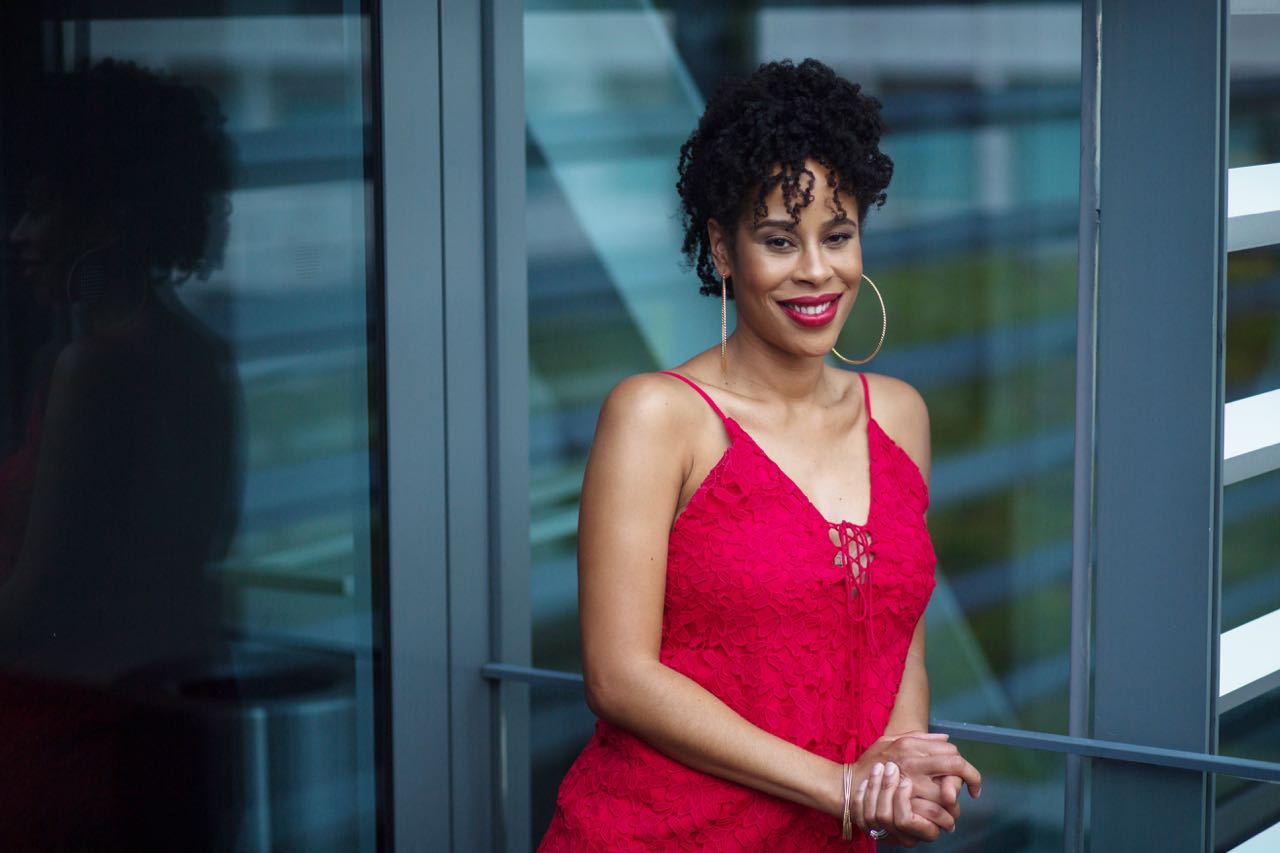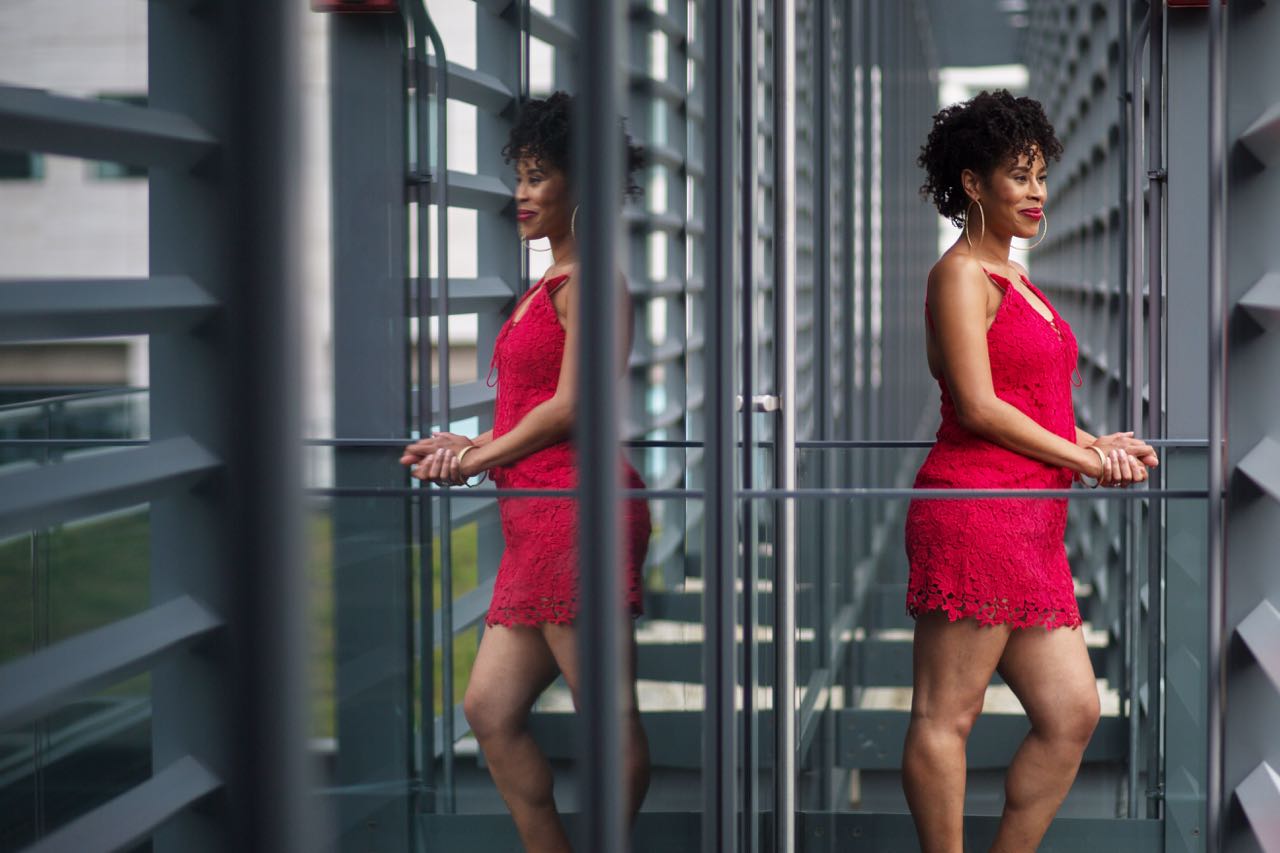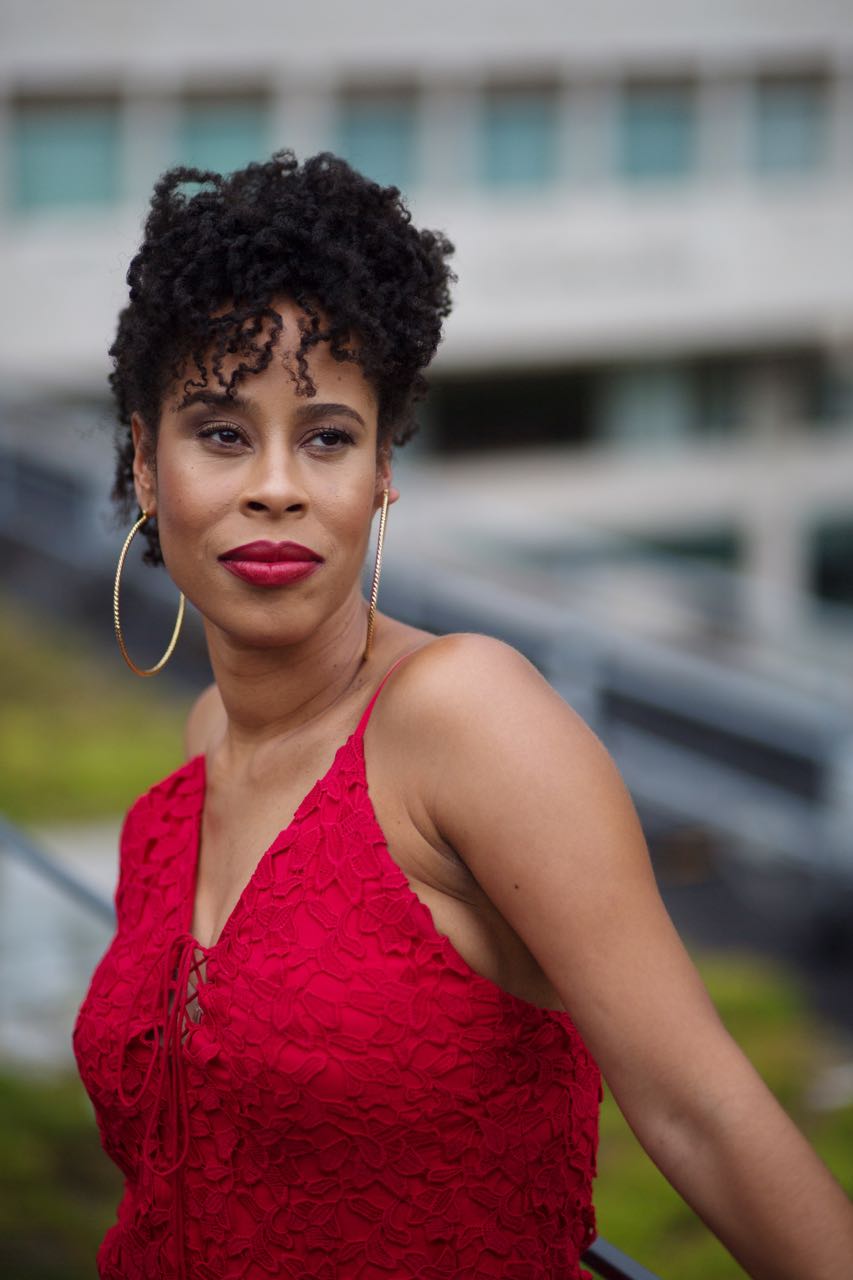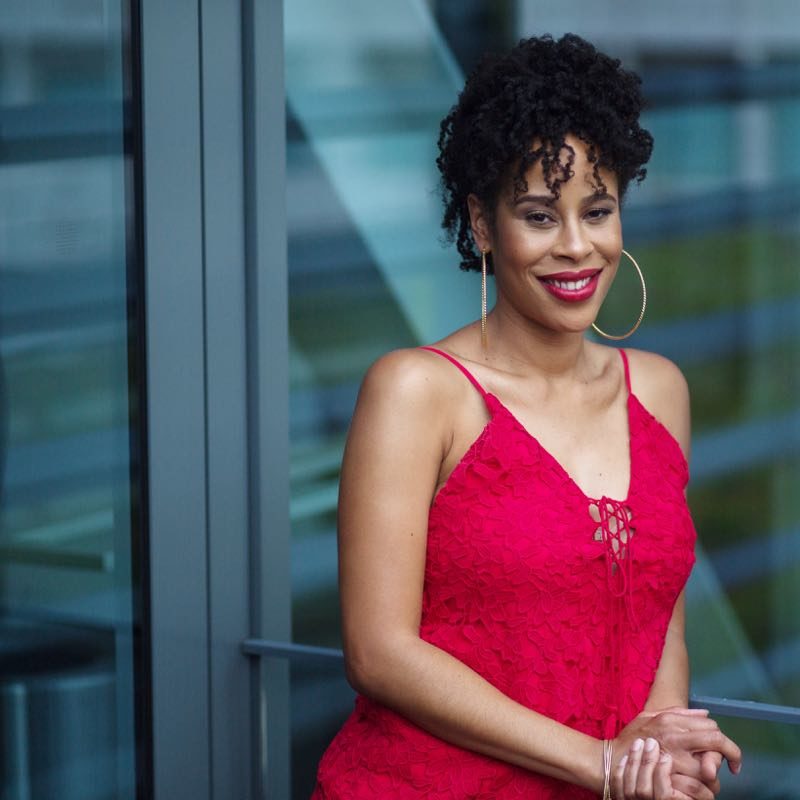An Interview with Dominique Morisseau

Written by Victoria Myers
Photography by Tess Mayer
July 25th, 2017
Last summer, one of the most widely read and celebrated pieces in The New York Times was a cover story in the magazine by Nikole Hannah-Jones called “Choosing a School for My Daughter in a Segregated City,” which shined a light on the continued segregation of the American school system. In Dominique Morisseau’s new play Pipeline, currently playing at Lincoln Center Theater directed by Lileana Blain-Cruz, a mother and son wrestle with what has commonly become known as the school-to-prison pipeline of the American education system for young men of color. The play also deals with language and perspective, a common preoccupation of Dominique’s, who is a playwright interested in whose stories we are telling and how we are telling them. Her other works include Skeleton Crew, Paradise Blue, and Detroit ’67 (the three plays that make up her Detroit Cycle); Blood at the Root; and Follow Me to Nellie’s. We recently spoke with Dominique about her inspiration and process for writing Pipeline, bringing new audiences to the theatre, themes in her work, and more.
I wanted to talk about your inspiration for Pipeline. I read that your mother was a teacher and that you’ve worked in education, so I was wondering if the play came out of thematic things you wanted to explore, or if it started with characters that you wanted to see where they went and what they had to say?
It started from the themes. I knew I wanted to write about the school-to-prison pipeline. It was pretty important to me. I had been reading Michelle Alexander’s book The New Jim Crow, which talks about mass incarceration and mass incarceration being the new Jim Crow. But I really believe education is also the new Jim Crow right now because there is so much segregation in education, and there’s an excessive system of have and have-nots. So I was first and foremost interested in exploring the school-to-prison pipeline because of how personally it affected some people in my life.
At what point did you decide that you were ready to start writing, or knew, “This is the entry point to actually make it into a play”?
There were a few incidents that happened to people in my life. One surrogate-nephew of mine had a bad incident at school and was quickly being criminalized online and in the press around the city where his incident happened. It shocked me and concerned me how quickly we criminalize and don’t give second chances to young men of color, and particularly young African American men. The other thing that was an inciting moment for me was when I started writing this play, I was in Scotland with my Penn State students working on a play called Blood of the Root, which was more about how six young black men were criminalized by an incident that happened at their school in 2007. While my students and I were in Scotland working on this play, Ferguson happened. I got really struck by Michael Brown and how it felt like he was a controversial figure, because even though he was a teenager, he had these ideas of having stolen a cigar, maybe, or because he posed with a face of defiance in his pictures, somehow that meant that he deserved the murder that happened to him. That he had somehow been complicit in his own murder, and that he was not worthy of soliciting so much public empathy. I was concerned about that deeply, and so the character of Omari became greatly inspired by the young man in my life, and by Michael Brown.
When you started writing, how did you funnel all of that information—personal experience, what was happening politically, and research—into your first draft?
The research part of this is really my own eye. I was an educator in New York City for about 15 years, and I’ve been an educator in my life for over 20. For me, going into this world of the school system was collecting my own memories and my own conversations. In New York City, I’ve taught in all five boroughs. I worked for an educational theatre company, and public high schools in the Bronx and Brooklyn and Harlem and Queens. I was everywhere. Through that experience, I’ve seen a lot. Once I had the initial idea to write the play, I didn’t have to do a lot of hard research. I watched a documentary about Chicago because I had originally written this play for Steppenwolf, so I was interested in looking at the Chicago educational system and how it compared to the education world that I came from in New York.
Did you do a quick first draft or was it a slow first draft?
It was pretty quick. While I was in Scotland, I ended up having my seniors read what would become the first half of the play. I had written it very quickly. Once I have an idea for a play, I can write it pretty quickly. The slowness of the writing comes from not actually sitting down and having time to write. If I have the idea and I sit down to write it, it doesn’t usually take me too long because a lot of the writing process for me happens in my mind before I sit down. Once I sit down, I’m ready to go.
How did you go about shaping your use of language in the play? It functions as part of the plot, and you use poetry in the piece, and then your own personal use of language in the writing.
The Gwendolyn Brooks [poem] and how I wanted her to resonate in the play, I didn’t pre-plan. As I was writing, and as [the character of] Nya was starting to teach a lesson, it was, “What’s she going to teach?” She’s going to teach We Real Cool because that’s a poem that I remember as a kid really haunting me. The eighth graders were participating in a black history show at our school, and I was given Maya Angelou’s Still I Rise, which was the awakening for me as a poet, and the eighth grade boys had Gwendolyn Brooks’ We Real Cool. When we would perform those two pieces together, it was profound, and I remember being blown away by how the eighth grade boys were performing because they seemed to understand the poem so well, and they understood the twist at the end. It blew my mind and it haunted me. When I started writing Nya’s lesson, I started remembering the haunted feeling. I was like, “Wow. When he sang these words and he gets to ‘die,’ that’s going to really mess with her.” Suddenly, in the middle of writing it, the poem started to take on a triple meaning for me in the play, and I thought, “Oh this is going to have to come back to her. This is not over.”
In my own use of language, some young boys who fit the demographic of Omari came to see the play a couple of nights ago—they’re in a young writer program, the Stargate Theatre Program at MTC—and they were fascinated with the use of language. I told them, “I hear the way that we speak, naturally, and every city and region has its own poetry.” Young people have their own poetry. Communities have a poetry to the way that they speak. I think it’s fun to listen to and relish in the poetry of our everyday language, as opposed to trying to force some elevated language onto the world. I think the world has its own elevated language, and I listen to and try to capture some of our poetry-ism in our everyday language that I hear, from the students that I work with to the members of my family when they speak. For me, it’s fun to exercise in the elevation of our everyday language.

How did you shape the characters in terms of who you wanted to include in this world, who you didn’t want to include, who were the onstage characters, and who were the offstage characters?
I wanted to include the people I thought were of the world that I had come from. I taught full-time at my mother’s school for one year before I left Michigan and moved to New York. I taught at a school in Highland Park in Michigan, which is an enclave inside of Detroit, and I call it one of the most economically stressed cities in our nation—I’d be willing to bet my money on that. Most of the teachers that I worked with and most of the teachers my mother worked with were black women and white women in that school. Some men, but the majority of that teacher staff were black and white women. In a very predominantly black school. When I used to teach around New York, there was a lot more diversity in the teachers, but a lot of the time I came into contact with the women. Where I came from, they were black and white. I wanted to include the people I remember working with. Especially for someone like [the character of] Laurie, who I think represents more than just a white woman. But she is a white woman in this environment. When you teach in these environments, you’re dedicated to those students, and you want to be there, and that is what it is. I felt for Laurie’s character. She’s a die-hard teacher in that space, and you kind of have to super believe in it, because there are too many other jobs you can go get. You have to have a life mission about being there, and I think she does. As for the guards, when I would teach, I thought a lot of times, the guards are doing the job of a hundred men. The guards that I knew, when my mother was teaching, would stay late with her after school while she worked on her lesson plan. They would just sit and be patient and walk her to her car so that she could stay late after school and feel safe. I wanted to bring those people into the world.
When we’re talking about offstage characters, I think it’s more important, for instance, not to show Omari’s teacher. I think it’s more important for us to explore the assumptions we have about that world rather than deliver it to us and hand it all to us and make it easy. I think it leaves more question and conversation when we start imagining, “Who is that teacher? What race is that teacher? What socio-economic status does that teacher have? What do you think that teacher’s relationship was with Omari?” I think those are more interesting questions than answers.
When you’re writing, in general, do you like writing more towards questions than answers?
Absolutely. I’m not so arrogant to think I have all the answers. I don’t have them. I have none. These are the things that stay on my mind all the time. These are things that I wrestle with and I’m trying to work out. There are some things I think I know, but I don’t know the full extent of it. In Pipeline, I do know that there are structural and cultural failures in both the private and public schools, so I know that there is a pipeline that our students are being sucked into. I do know that, and I do know that it’s going to take some work and some recalibrating how we look at education and who we’re listening to when we talk about education. I know those things for sure. What I don’t know is how we do all that. I feel like if I ask the important questions that I have around it, maybe, collectively, as a society, we will start to have the kind of conversation that can find a solution.
Do you use things like music or art when you’re writing?
Absolutely. All the time. One of the songs in Pipeline, the sound designer used because I told him it was a song I listened to all the time when I was writing, which was Stevie Wonder’s Jesus Children of America. That song speaks to my soul. It always made me think of what the real call to education is, which is that you’re really trying to lead these children through the abyss into something, which is what that song encompasses for me. Also, this idea of telling your story fairly, I thought for Omari, that’s what the play is asking for him—for us to be able to look at his story fairly.
Do you see your plays as plays on stage while you’re writing or do you imagine them more as real life?
A little bit of both. I think it’s a mixture of seeing them in real life and seeing them on the stage. I see their type of people in real life, but I imagine the journey of them on stage. I imagine their movements happening on a stage.
In general, playwrights’ themes in their writing are usually something that are defined by other people, but do you see any themes in your work?
I think the one thing I can say I’ve learned to embrace, that I didn’t always, is the idea of being a political writer. I did not look at myself as a political writer for a very long time because I’m not trying to push a political agenda, per se, or tell people what politics to embrace, but I am looking at how politics, in a certain light, impact people. I’ve learned to embrace that I have a very strong social justice call to my work. Even when the work is very personal and not pushing a political agenda, there is some sense of justice I am always seeking for my characters. How are they or are they not getting justice in their lives for the things that they want? How are they or are they not being measured fairly by each other and by the world? And how are they or are they not being considered by those who have status over them?
A question that I ask actors a lot has to do with typecasting. As a writer, do you worry about getting typecast? Like, “She’s a writer who does this. This is her thing.”
I’m not worried about it. I take pride about what I own about what I write. If someone tries to narrow my gaze, I just simply won’t let them. Some people try to call me a writer who writes plays about Detroit, but that’s not true because Pipeline does not take place in Detroit. Or I’ll write a musical when you think I’m just a legit straight play writer. Or I’ll put in poetry, or I’ll do dance. I refuse to be limited, but I don’t have a problem being specific about what it is that moves me as a writer. I just refuse to let anyone typecast me, so I’m not really worried about it.
What’s something you think the theatre community can do to make the development process better?
I think, for one, we need to diversify dramaturgy and dramaturgs. I’ve worked with certain dramaturgs where it bumps their ability to really help me settle into my own language or the point I’m making in my work because they don’t understand some of my cultural references, and when they don’t understand those references, it sometimes will come off as a failure of the writing, which it is not. It will help us in every category of theatre if we diversify the dramaturgy that theatres are bringing onboard for the playwright. I think people might have their own dramaturgs that they like working with, or someone who has been following the breadth and span of their specific work, so they want that person in the room to help them develop their work. I think that’s really important for theatres to start making space for in the development process. I really think that’s a big key component to strengthening and helping playwrights to be able to trust the process. Sometimes your foot might not fit into that particular shoe of development, if you haven’t talked about those things. So I think that as much as you can cater development to the playwright’s needs—and cultural needs as well as literary needs, because those things are not necessarily divorced—I think that that would be helpful, just like I think that would be helpful in education.
I think you’re the first person who’s ever mentioned dramaturgy as an answer to that question.
I do think that most writers [don’t like] dramaturgs, but I think that’s also because we don’t select them. We are not part of the process a lot of times in selecting them, so we’re just going somewhere and being told how to make our plays better by someone we didn’t necessarily appoint as the authority on our work.

Going along with the idea of new work, is there anything that you think can be done to either engage new audiences in theatre or engage existing audiences differently?
Absolutely. That is something that I believe in to the fullest, and I’ve actually taken a lot of initiatives to work on that. I think one big thing is that theatre in general is not doing, is getting the ear of the young generation, and the non-older white audience. They just have not done a lot of cultivating of those communities. They’ll put it out for one show, but that’s it. They won’t see them in droves. What I really can applaud Lincoln Center on is that their Director of Marketing and their marketing team has stayed open to me coming in and having conversations with them and taking a leadership role in the marketing with them for Pipeline. They made space for me to take on some leadership in marketing, because I have very strong ideas about how to get diverse audiences into my play, and they’ve listened and they assisted me and helped take the charge. But I think we’ve seen the most diverse audiences that they’ve seen at Lincoln Center for my play.
Would you mind giving an example of that?
One thing that I did because I come from education—I know a lot of educators and I know a lot of young people in the city—I really pushed for educator night. Throughout my play we have held various talkbacks and panels with experts and activists from the education field and from the school-to-prison pipeline field. I’ve also created an initiative with Lincoln Center. After one of my performances, I asked the audience, “Would you be interested in sponsoring a young person to come see the play? If so, come talk to me upstairs.” I literally took a list of people who would be willing to donate money to get young people to come see the show. We’ve raised almost $10,000 to basically give away free tickets to groups of students. We’ve raised $10,000 because Lincoln Center came on board and helped me funnel the money. We worked with partners on turning that into getting matching grants for all the money donated. It’s been really amazing, and we’ve been getting young people to come see the show. We’re talking about kids from the Bronx and kids from Brooklyn to come see a show at Lincoln Center for free.
With Pipeline, is there anything with the play and doing press for it where you’re like, “I really wish people would talk about this part of it”?
I wish that they would talk about how much the audience is also part of the experience. I’ve done other initiatives where I’ve held theme nights for various audiences of color. Those nights have resulted in groups of those communities coming out and seeing the show, and I would like people to talk about that, because that’s how people are experiencing Pipeline. Those audiences bring a different culture to the theatre than the normal Lincoln Center subscriber base, so when you mix those two groups together, everybody is having a whole different kind of experience. Lincoln Center audiences have talked about how exciting it has been to be in this mixed audience, and how much it has changed the culture of how their audience responds to theatre. We’re mixing cultures together in a cool way.
What’s something you think the theatre community can do to help with gender equality in theatre?
I think it’s the same thing that we could do to balance racial equality in the theatre. We have to see more women in leadership roles in theatre because that is going to shift the programming that’s happening all throughout those theatres. We have to see more women as dramaturgs, more women as artistic directors, more women as associate artistic directors, more women directors. I think those things help. I also think that a woman running Lincoln Center’s marketing department did not feel intimidated by another woman coming in and saying, “I have ideas, really strong ones. Let’s work together.” There wasn’t some sense of superiority/inferiority complexes, there was a sense of collaboration.

